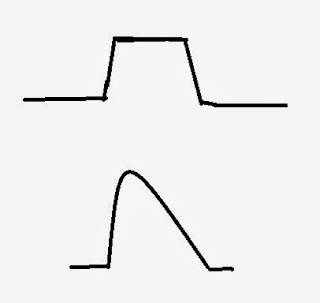Troubleshooting in liquid chromatography / HPLC can be made easier, if one learns to recognize the symptoms produced by an instrument malfunction, leaks, or column problems. Some of the symptoms are described below:
Symptom: Column pressure erratic in an HPLC system
Symptom: Column pressure erratic in an HPLC system
Possible Cause: Leak
in high pressure system before column
Action: Locate and repair leak
Possible Cause: Foreign
material in column pump check valves
Action: Disconnect liquid inlet and
outlet lines. Syringe 20 ml of fresh solvent through liquid end. Reconnect lines. If the above fails,
disassemble liquid end and clean check valves
Symptom: No column
flow or column pressure
Possible Cause: Leak
in system before column
Action: Locate and repair leak
Possible Cause: Air
in column pump liquid end
Action: Disconnect liquid outlet
line and pump at maximum until no bubbles appear
Symptom: Poor peak
shape (Fig. 1)
 |
|
Fig. 1: Poor peak shape in a liquid chromatogram
|
Possible Cause: Column
overloaded
Action: Inject less sample, less
concentrated sample or change diluent to match mobile phase. If possible, change
to another column with higher sample capacity.
Symptom: Loss of
resolution (Fig. 2)
 |
|
Fig. 2: Poor resolution in a liquid chromatogram
|
Possible Cause: Column
overloaded
Action: Reduce amount of sample
Possible Cause: Bad
column
Action: Replace with a new column
Possible Cause: Strongly
retained compound on ion-exchange column
Action: Regenerate the column
Symptom: Increased retention
time (Fig. 3)
Possible Cause: Low
flow rate
Action: Increase solvent flow rate
Possible Cause: Solvent
leak before injector (if same peak height)
Action: Repair leak
Possible Cause: Low
column temperature
Action: Increase column temperature
Possible Cause: Improper
gradient
Action: Check functioning of
gradient system / increase concentration more rapidly
Possible Cause: Column
deterioration
Action: Change column
 |
|
Fig. 3: Increasing retention times in a liquid
chromatogram
|
Symptom: Decreased retention
time
Possible Cause: Loss
of liquid phase from column
Action: Replace column
Possible Cause: Column
not regenerated after gradient elution
Action: Regenerate column
Symptom: Baseline
“stepping” baseline does not return to zero, peaks are flat on the top or show
steps (Fig. 4)
 |
|
Fig. 4: Baseline stepping and flat-topped peaks
|
Possible Cause: Recorder
gain and / or damping control improperly adjusted
Action: Adjust recorder gain
Possible Cause: Instrument
and /or recorder not properly grounded
Action: Connect instrument and
recorder to good earth ground
Symptom:
Peak shoulders (Fig. 5)
 |
|
Fig. 5: Peak shoulders in a chromatogram
|
Possible Cause: Column
overloaded or bad column
Action: Reduce amount of sample or
replace the column
Possible Cause: Packing
voids/channeling in column
Action: Replace the column
Possible Cause: Poor
tubing connection at the head of the column
Action: Connect tubing properly
No comments:
Post a Comment